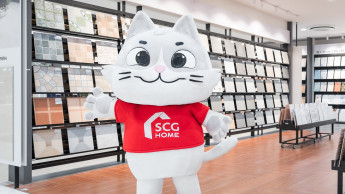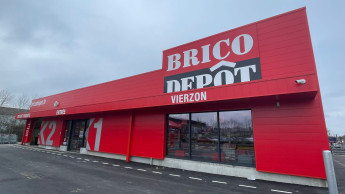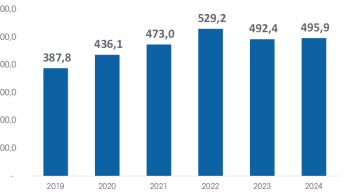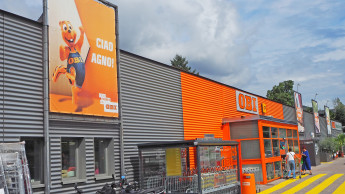
deep insights, facts & figures
04.09.2013
The UK DIY market declined to an estimated £ 7.54 bn f. Statistics show that the sector as a whole experienced a four per cent decline year-on-year. Nevertheless the three key players in the market are operating more stores than they can sustain
2012 proved to be another challenging year for the UK DIY market which declined to an estimated £ 7.54 bn from a high of £ 9.76 bn in 2004 (Verdict research). Statistics from GfK show that the sector as a whole experienced a 3.9 per cent decline year-on-year. The unpredictable British weather had a significant impact on sales of DIY and gardening goods: the spring brought lower than average temperatures combined with higher than average rainfall, while the summer was heralded the wettest in over 100 years. Furthermore, the housing market – a key driver of sales within the DIY sector – remained depressed, as did consumer confidence. The all-important Easter trading period suffered badly as a result of the unseasonably cold and wet weather which forced garden related sales down to around half the previous year’s figures. Overall, DIY sales values in the second quarter declined by 13 per cent compared with 2011 (GfK). Weather conditions improved during the latter half of the year, prompting year-on-year value growth of 1.2 per cent in the DIY/garden market during the third quarter. During this period the UK hosted the Olympic and Paralympic Games, and while these events served to promote a ‘feel-good factor’ across the UK, it is thought that they may have distracted consumers from undertaking DIY tasks. Although there were no high profile casualties in the DIY sector during 2012, it became clear that the three key players in the market – B&Q, Homebase and Wickes – are operating more stores than they can sustain. In September 2012 Kingfisher CEO, Ian Cheshire, said: “B&Q has begun a property review. We’re looking very carefully at every foot of space.” He added: “We’d be very happy to get out of some B&Q stores over time.” These retailers are all understood to have established ‘right-sizing’ plans to gradually reduce store space by between 10 to 30 per cent over the next few years. B&Q: Kingfisher’s UK and Ireland operations saw a sales decline of 2.0 per cent (-5.2 per cent on a like-for-like basis) to £4.3 billion during 2012. B&Q UK & Ireland’s sales declined by 3.6 per cent (-5.6 per cent on a like-for-like basis) to £ 3.7 bn. Challenging economic conditions saw B&Q’s nine Irish stores suffering losses of £ 7 mio, resulting in the stores being placed into Examinership in early 2013. A rescue plan was approved but one store was forced to close during the process. The B&Q TradePoint proposition made good progress, with trade customers numbering over 1.2 million by the end of the year. This compares favourably with the 200,000 members registered with the previous B&Q Trade Discount card. A highlight for Kingfisher was the performance of its Screwfix chain which went from strength to strength during the year, reporting a sales increase of 9.8 per cent and a 33.9 per cent rise in retail profit. During the first half of 2012, the Screwfix brand launched a new, smaller format store under the DIY Express fascia. Marketed as ‘the local DIY store’, DIY Express carries a range of over 5 000 products for immediate purchase. Customers are also able to order from an extended selection of Screwfix product lines, with the option to use the ‘Click, Collect & Go’ service. Two branches were opened initially but one closed with little warning in August 2012. Screwfix advised that it had only been open for a trial period. Homebase: Sales at Home Retail Group’s Homebase chain fell by 5.2 per cent during 2012 (-4.9 per cent on a like-for-like basis) to £ 1,431 mio. Operating profit declined by 52 per cent to £11m. To address the decline, Homebase adopted a new strategy and plans to position itself as a “clearly differentiated multi-channel home enhancement retailer, creating both a store and online experience, with a softer, more stylish female-friendly proposition”. To underpin the new strategy Homebase has developed a new store format which it put into action in the Aylesford branch in 2011. The concept has evolved and further refits took place in 2012. Many stores now feature inspiring help and advice centres as well as Laura Ashley and Habitat concessions, and many have seen mezzanine and garden centre refits to help boost sales of big ticket and garden goods. Homebase experienced its fourth consecutive year of growth in the sheds market and now holds an overall share of 24 per cent; its highest recorded share since GfK sheds market research was launched in 2007. Wickes: During 2012 the consumer division of Travis Perkins plc, which includes Wickes, Tile Giant and Toolstation – the latter acquired in January 2012 – delivered an overall turnover increase of 13.2 per cent to £ 1,152 mio. Profits increased by 40.7 per cent. Travis Perkins stated that the division had outperformed in 2012, with all three businesses producing excellent results, citing careful margin management, strong overhead control and targeted investment as contributory factors. The thirteen stores acquired from the receiver of Focus DIY in 2011 at a cost of €10 mio were reported to be performing ahead of target. Mid-year, Wickes had confirmed it was investing £10m into lowering prices, confirming a shift towards an EDLP (every day low prices) strategy to better cater for its price conscious customers. The retailer closed its loyalty card scheme to help fund the investment, advising that prices would drop on around 5 000 of its 10 000 product lines. Overall, while the poor weather and difficult economic environment held back sales of gardening and outdoor DIY goods during 2012, GfK data showed growth within the interior decorating market, particularly during Easter, indicating that consumers are still willing to undertake DIY tasks, despite the growing trend of ‘do-it-for-me’ where consumers hire tradesmen to undertake work on their behalf.
Related articles
Read also

 Menü
Menü















